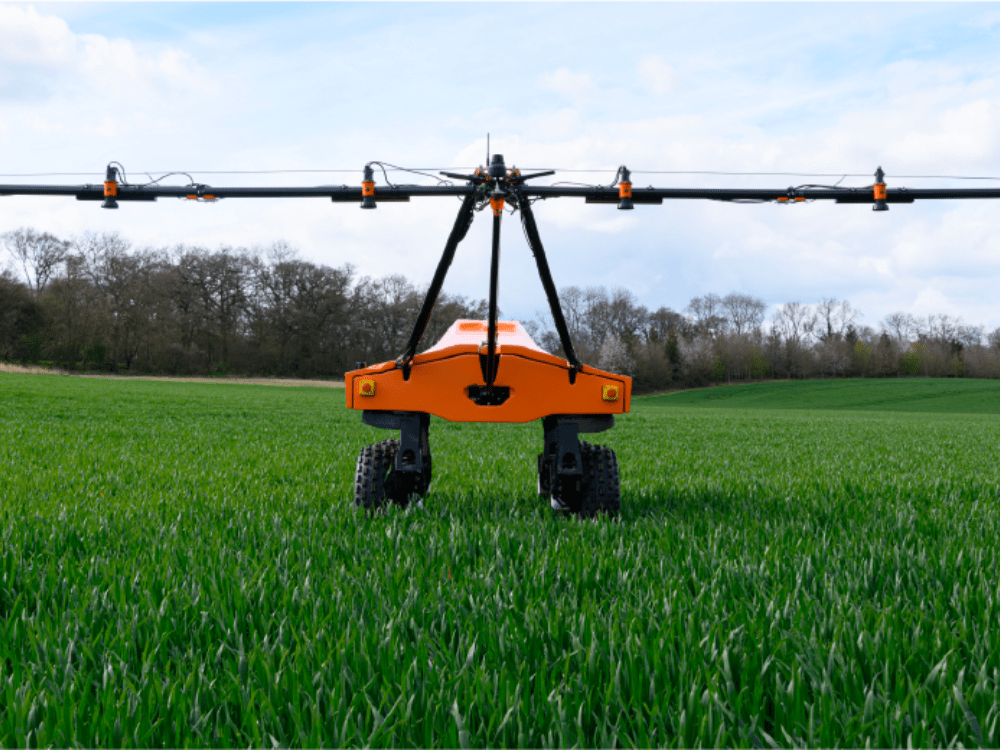British ag robotics startup Small Robot Company (SRC) says it has a “high degree of confidence” that it’s “through the danger zone” it entered after recently losing its lead investor in a funding round.
The company offers what it calls “per plant” intelligence via its small Tom robot that autonomously maps an entire field to detect weeds, pests, compaction and other factors. Its AI intelligence advisor, Wilma, takes data points from Tom and converts them into advice for farmers. Wilma can also predict yields from emergence data, survival rates and tiller counts, says SRC.
Another ‘bot, Dick, can autonomously zap weeds and is in field trials for non-chemical weeding.
‘We are looking to get as much runway as we can’
Last Thursday, SRC put up a statement on its website saying it was “unable to close [its] investment with a lead investor” and that it had “no financial runway left.”
“They were deep tech specialists and they didn’t feel confident that they knew enough about ag to commit to making an investment in that market,” SRC’s CMO Sarra Mander tells AFN. SRC has not disclosed the name of the would-be investor.
Mander says the companies had gone through due diligence and were on the point of closing the deal before it came to a halt. “The blocker for [the investor] was lack of knowledge about the agricultural market. It was too risky for them.”
Via a pledge campaign, SRC is now asking for £1.5 million ($1.9 million) in backing from the public to gain a “long enough runway to secure another lead investor on reasonable terms.”
Mander says SRC raised £500,000 ($631,000) overnight and and is now 90% to its £1.5 million goal. “That basically gives us enough runway and enough time to continue to explore more options for funding, and indeed all options, including exit.”
She says SRC is “pretty confident” it will hit that target, which is a minimum “survival” goal. The pledge campaign also lists a £3 million ($3.8 million) “inflection point” goal and a £4 million ($5 million) “escape velocity” goal that would position SRC for its next phase of growth.
“Ideally we are looking to get as much runway as we can,” says Mander, adding that the company will continue to pursue its Series A.
To date, SRC has raised £8.4 million, or about $10 million.
‘An endemic issue in the UK’
SRC may be nearing greener pastures, but Mander suggests the lack of a robust knowledge pool when it comes to digitizing agriculture is a problem for ag robotics startups across the UK.
“It seems this is a an endemic issue in UK agtech. There’s actually an incredibly limited local pool of ag specialists and that is hurting investment, particularly in this current market. People are more risk averse.”
SRC’s message posted last week put it more bluntly: “We have been unable to close our investment with a lead VC investor. They like our tech, our team, but find agriculture too risky.”
The problem is bigger than agriculture, Mander adds, with “most UK robotics companies fac[ing] a serious scaling issue.”
While there’s plenty of support for early-stage proof-of-concept prototypes, there isn’t much beyond that from either VCs or government grants.
“A lot of work goes into taking something from TRL [technology readiness level] three to TRL eight, nine, and that’s actually where the biggest investment comes. It is not currently supported by UK Government grant funding.”
More strategic support from the top of government is necessary to combat this challenge, she adds. In comparison, support for up-and-coming industries like ag robotics in France, Israel and the US “is very different. You can see that with the pace that they’re bringing robots to market.”
Despite challenges in the UK, broader ag automation — be it data collection or actually zapping weeds and applying crop protection — is rising amongst growers, most notably in the US and Europe. A recent report from Western Growers Association found that weeding robots are the top pick for those currently investing in automation.
SRC remains realistic about its prospects, even with the recent surge of support from crowdfunding. “It may well be that we take ourselves through our own valley of death with angel investors,” says Mander.





